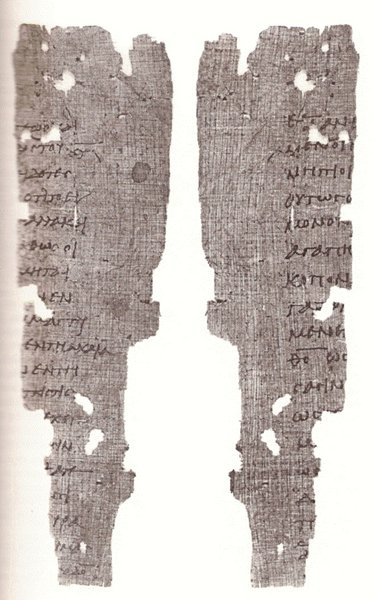| Change to Book/Chapter View |
|
|
|
Translation process is ongoing. For current status see details |
|
|

Papyrus 65 Date: Middle of the Third Century A.D. Discovered: Probably Oxyrhynchus, Egypt Location: Paris, France; Bibliotèque Nationale Contents: 1 Thessalonians 1:3-2:1, 6-13 Notes: This is considered to be from the same codex as Papyrus 49. This papyrus is only a narrow portion that ran down the side of an original page.
1 Thessalonians 1 3 remembering
without ceasing your work of
faith and labor of love and perseverance of hope in our Lord
1 Thessalonians 2 For you yourselves know, brothers, our visit to you wasn’t in vain, [..] 6 nor seeking glory from men (neither from you nor from others), when we
might have claimed authority as apostles of Christ. 7 But we
were 8 Even so, affectionately longing for you, we were well pleased to impart to you, not the Good News of God only, but also our own souls, because you had become very dear to us. 9 For you remember, brothers, our labor and travail; for working night and day, that we might not burden any of you, we preached to you the Good News of God. 10 You are witnesses with God how holy, righteously, and blamelessly we behaved ourselves toward you who believe. 11 As you know, we exhorted, comforted, and implored every one of you, as a father does his own children, 12 to the end that you should walk worthily of God, who calls you into his own Kingdom and glory. 13 For this cause we also thank God without ceasing, that when you received from us the word of the message of God, you accepted it not as the word of men, but as it is in truth, the word of God, which also works in you who believe.[2]
|
How to read these pages: • The
translation to the left is based on the World English Bible. Words in regular
black font are words in the manuscript matching the Majority Text for that
passage. • Words
in italics cannot be seen in the manuscript, since the manuscript is
fragmentary. These words are supplied for readability by the World English
Bible translation. • Words
present in the manuscript but with some letters unreadable or missing are in blue
like this: blue. One Greek word often is
translated into multiple English words, and when this occurs, all the English
words are in blue. • Words
present in the manuscript but with spelling or trivial word order differences that do not affect the
meaning are in green like this: green. • If
the manuscript is different from the Majority Text, words in the Majority
Text that are missing from the text of the manuscript are marked through in red
like this: • If the manuscript is different from the Majority Text, words in the manuscript that are not in the Majority Text are underlined in red like this: new words.If the manuscript differs from the Majority Text yet matches another well-known text, this is noted in the footnotes.
|
